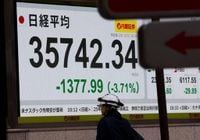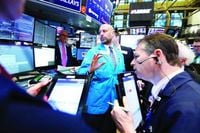Global stock markets are currently experiencing significant fluctuations, primarily driven by concerns surrounding the potential economic impact of U.S. presidential policies, particularly the proposed tariffs by President Donald Trump. On Monday, March 31, 2025, the American stock market faced sharp declines, with the S&P 500 index falling by 0.4%, while the Nasdaq composite index decreased by 1.3%. Conversely, the Dow Jones Industrial Average showed a slight increase, gaining 133 points, or 0.3%, reflecting a mixed sentiment among investors.
Investor anxiety heightened as the Trump administration's tariffs are set to come into effect on April 2, 2025. This includes a controversial 25% tax on all cars not manufactured in the United States. The impending tariffs have stirred fears of a broader economic slowdown, prompting many traders to reevaluate their positions. Jason Draho from UBS Global Wealth Management remarked, "Despite the hope among investors, it is unlikely to put an end to the uncertainty surrounding tariffs." He further noted that volatility in the market is expected to rise as investors reassess their expectations in light of recent developments.
Technology stocks, which had previously soared due to increased interest in artificial intelligence, faced significant setbacks. Shares of Nvidia and Meta Platforms dropped by 4% and 1%, respectively, with Nvidia's stock down more than 31% from its 52-week high. Tesla also saw a decline of 4%, indicating a tough day for tech investors. In contrast, some Dow Jones companies, such as Coca-Cola and Walmart, benefited from investors seeking safer havens amidst the turmoil.
Across the Atlantic, European markets mirrored the anxiety seen in the U.S. The European STOXX 600 index opened with a sharp decline of 1.2%, with all major sectors and exchanges suffering losses. The German DAX index was particularly affected, dropping by 1.2% during trading. The automotive sector was hit hard, with shares of Volkswagen, Mercedes-Benz, and Renault falling by 1.7%, 1.5%, and 2.5%, respectively. The heavy sell-off in European markets is attributed to the looming tariffs and their potential impact on economic growth.
In Asia, markets also reacted negatively to the impending tariffs. The Japanese Nikkei index fell by 4.05% to close at 35,617.56 points, marking its lowest level since early August 2024. This decline follows a day of significant gains, highlighting the volatility in investor sentiment. Hiroyuki Ueno, a senior expert at Sumitomo Mitsui Trust Asset Management, stated, "Investor concerns are growing due to the presence of many variables before the announcement of the U.S. tariffs." The broader TOPIX index also experienced a decline of 3.5%.
In South Korea, the KOSPI index fell by 2.83%, while the KOSDAQ for smaller companies decreased by 2.94%. This drop came as the regulatory body lifted a long-standing ban on short selling, allowing investors to bet against stocks as uncertainty looms. Meanwhile, in Australia, the S&P/ASX 200 index ended the day down by 1.54% at 7,859.30, ahead of a crucial monetary policy meeting for the Reserve Bank of Australia.
As the situation develops, analysts are closely monitoring the economic indicators and the potential repercussions of the tariffs. Goldman Sachs has already lowered its earnings estimates for multinational companies in both the U.S. and Europe, forecasting a drop of about 4 percentage points from previous consensus estimates. Preliminary data from Germany indicated a decrease in consumer price inflation to 2.3% in March, slightly below economists' expectations of 2.4%. This data is expected to be followed by inflation figures from the Eurozone on April 2, 2025.
In the face of these challenges, the European STOXX 600 index recorded a 2.7% decline in March, marking its largest monthly drop since October 2024. However, it still managed to rise by 5.2% in the first quarter of the year, outperforming its U.S. counterpart due to strong financial support from Germany and concerns over U.S. growth.
As markets brace for the implementation of tariffs and the subsequent announcements from President Trump, investor sentiment remains fragile. The coming days will be crucial as traders assess the potential impacts on both domestic and global economies. With the uncertainty surrounding U.S. policies, many are left wondering how deep the repercussions will run and whether the markets can stabilize in the face of such volatility.






